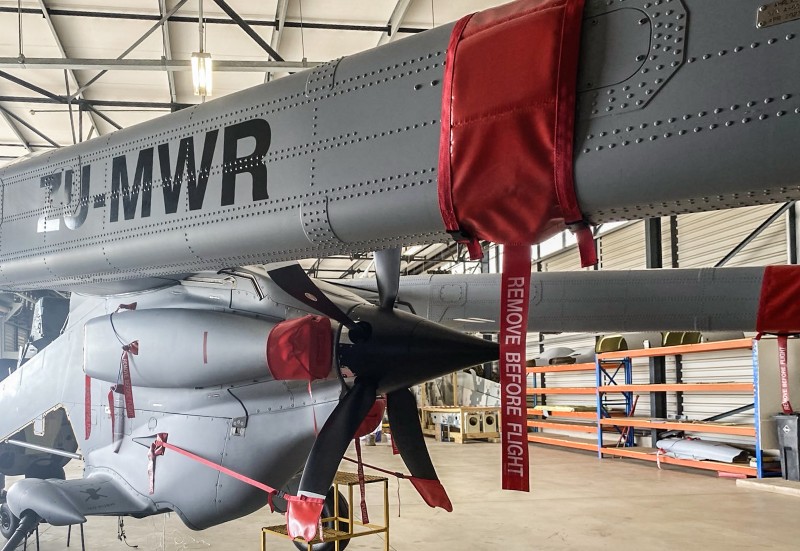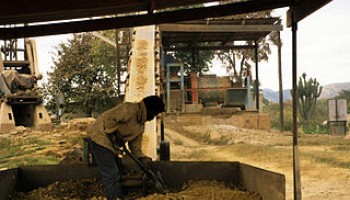Reported by
The defense firm Paramount Group has provided information to a South African anti-corruption agency, which is investigating claims that companies in the United Arab Emirates unlawfully obtained intellectual property developed by South Africa’s arms industry.
The probe focuses on employees of at least two defense firms who are suspected of passing military intellectual property (IP) to UAE state-owned companies.
“Paramount Group is cooperating fully with the Special Investigations Unit (SIU) in its investigation into alleged wrongdoing by UAE Government-controlled entities, particularly as it relates to the unlawful targeting of South African defense intellectual property,” Lynn Lauth, a lawyer for Paramount, told OCCRP.
OCCRP obtained two briefings from the SIU, which focus mainly on allegations that employees of a second company, Denel SOC Ltd., "misappropriated" military IP, which is the research and design that underlines arms production.
One of the documents obtained by OCCRP was a 2023 presentation to Parliament’s Standing Committee on Public Accounts, while the other was a power point briefing of investigation findings in 2025.
The SIU declined to answer detailed questions on its investigation, saying that it “reports only to the President and Parliament.”
“Therefore, we cannot make public statements or give comments on ongoing investigations,” a spokesperson added in an email. “However, it is important to note that evidence indicating criminal conduct has been referred to the National Prosecuting Authority."
While Paramount is cooperating with the SIU, the company has also launched its own internal probe to determine whether employees provided IP to a UAE company after a joint venture deal that eventually collapsed.
'Pattern of Misconduct'
Founded in South Africa in the early 1990s, Paramount is now headquartered in the UAE. The company filed for bankruptcy last year after losing an arbitration case in London against Abu Dhabi Autonomous Systems Investments Company (ADASI).
Paramount’s problems began in 2016 when one of its subsidiaries, Riverston Enterprises Limited, entered into a joint venture deal with ADASI. The joint venture fell apart after ADASI was taken over by another UAE state-owned firm called Edge Group, according to internal records and court documents obtained by OCCRP.
As part of the agreement to set up the joint venture, ADASI had provided Paramount with a loan of $150 million, an internal document from Edge shows. That money was meant to cover the costs of creating the joint venture company in the UAE, and transferring the IP behind Paramount’s reconnaissance plane, which the new company would transform into an armed strike aircraft called the MWARI.
Both ADASI and Paramount agree that the IP was never transferred to the UAE according to plan. But while Paramount says it is no longer legally obligated to transfer the IP, ADASI says it has the rights to the information under the arbitration ruling,
Neither Edge Group, which owns ADASI, nor its public relations representatives responded to requests for comment. But a legal document filed by ADASSI in Paramount’s bankruptcy case provides insight into its position.
In the legal filing, ADASI argued that Paramount’s bankruptcy case was a stall tactic meant to give the company time to move its assets so they could not be transferred. Those included the “potentially valuable intellectual property assets,” which had been “granted to ADASI.”
The filing states that Paramount said it declared bankruptcy, because it could not afford to pay the penalty ordered by the arbitration board. That penalty totaled $230 million, and included the $150 million that was to cover the transfer of its aircraft IP to the UAE.
Paramount’s South African lawyer, Lauth, told OCCRP that the IP of the MWARI aircraft “remains wholly governed by South African law and has not been externalized to the UAE, ADASI, EDGE or any related entity.”
IP that is used exclusively for military purposes is often not patented, since doing so would make the designs accessible to competitors and hostile actors. Instead, such IP is considered a “sovereign asset” overseen by the government, according to experts including Vanessa du Toit who previously ran the National Conventional Arms Control Committee, which oversees South Africa’s military technology and arms exports.
Lauth said the research and design behind the MWARI was “not the only intellectual property that was allegedly targeted.”
“Our clients have identified a broader pattern of misconduct involving multiple Paramount-developed platforms,” she told OCCRP.
A Paramount factory in South Africa where the MWARI aircraft is produced.
In a leaked document from the arbitration case, Paramount founder Ivor Ichikowitz, said the deal was based on ADASI ordering 5,000 armored vehicles, and 6,000 “loitering munitions,” which are drones built to explode on impact. In the end, only four trucks and 500 drones were ordered by the company.
“In hindsight, it now appears that the presentations and solutions we presented may have been used by… staff to benchmark other defence projects underway at the time in other organizations in the UAE,” Ichikowitz said, according to a leaked affidavit from the arbitration case.
Ichikowitz declined to provide comment to reporters.
Martie Baumgardt, a senior executive, told OCCRP the firm is also carrying out its own internal probe. She said the company is looking into the “possible theft of IP from Paramount by individuals who left the company, which may conceivably have ended up in the UAE.”
According to Baumgardt, after the joint venture with the UAE partner broke down, 45 Paramount employees joined Edge Group companies.
A leaked document from Paramount’s internal investigation also alleges that 57 laptops and 10 hard drives were stolen between 2016 — the year Paramount’s subsidiary entered the joint venture with ADASI — and 2024 when it lost the arbitration case.
The Denel Affair
Meanwhile, the Denel case dates back to 2012, when South Africa’s state-owned arms manufacturer entered into a joint venture with a UAE firm, then known as Tawazun Operation Company LLC. Under the agreement, the two firms established a new company based in the UAE called Tawazun Dynamics LLC.
According to the 2023 briefing to the Parliamentary Committee on Public Accounts, the joint venture was initially intended to manufacture and supply Denel missiles to the UAE Air Force, and “future customers.”
At first, the partnership appeared to be a success. Other deals were soon struck in which Denel would also provide a UAE defense company called NIMR Automotive LLC with RG35 Military Vehicle IP and hardware.
But the relationship soon began to sour.
“It is alleged that the IP belonging to the institution was misappropriated in cohesive criminal conduct to abet foreign state companies,” the SIU said in its 2023 briefing, referring to allegations brought by Denel.
In its investigation, the SIU found evidence suggesting that Denel employees may have accessed IP without permission.
In one instance, SIU investigators found that “data packs” relating to missile technology had been downloaded from Denel’s system after a request from Halcon, another arms company owned by Edge Group, according to the 2023 briefing.
That briefing also outlines a case reported by Denel to the SIU, which involved IP for a military vehicle. The SIU noted that contracts had been signed with NIMR by a Denel employee who was not authorized to do so.
“This official later resigned and informed Denel that he was offered a senior position by Nimr,” the briefing says.
Denel reported that it had later received a letter from the CEO of NIMR Automotive, who had previously worked for Denel, demanding IP for a military vehicle.
The joint venture company Tawazun Dynamics is today called Al Tariq, and — like NIMR — it is owned by Edge Group, which did not respond to questions about alleged attempts to transfer IP from Denel.
The NIMR CEO was one of more than 300 Denel employees who left the company and went to work in the UAE’s arms sector, according to a summary of a South African parliamentary discussion in February.
Gloria Serobe, chairperson of the Denel board, told the parliamentary committee that so many Denel employees had left for UAE companies that “some board meetings were done in Afrikaans,” a language spoken only in South Africa.







